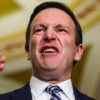Some supporters of the health care “reform” bill being shoved through the Senate are dismissing concerns over the individual insurance mandate and the tax penalty imposed on those who don’t meet that requirement. They claim that because § 5000A of the bill waives criminal prosecution of taxpayers and says that no liens or levies can be filed on the taxpayer’s property, this is supposedly a “voluntary mandate” and the IRS can’t do anything against you if you refuse to pay the penalty.
That claim is wrong for a number of reasons. First of all, if you refuse to pay the penalty or you refuse to provide any information on your health care status on your tax return, you will face the prospect of being audited by the Internal Revenue Service, something that rightly scares all taxpayers, including those who are law abiding and have done everything they think they should to comply with the law. IRS tax audits are notoriously intrusive, intimidating, and expensive, and the IRS is known for its consistent inconsistency in applying its complex and Byzantine rules and regulations.
The IRS, which is known for its habit of disregarding court decisions that disagree with its interpretations of the law, may use audits and the ability to find problems in a taxpayer’s finances in areas totally unrelated to the health care mandate to force compliance with the mandate and coerce payment of the tax penalty imposed by Reid’s bill. There will certainly be pressure from Congress, which has oversight and budget authority over the IRS, to do so. CBO itself made clear that the financing of healthcare reform is based in substantial part on generating $167 billion in “penalty payments” from individual taxpayers and employers, i.e., businesses whose worst nightmare is getting audited by the IRS. If there is mass civil disobedience by American taxpayers refusing to comply with this provision on their tax returns, there is no doubt that the need for this revenue will cause Democrats to attach a quick one-sentence amendment to a must-pass appropriations bill in the future that voids the waiver of criminal prosecution and the ability to levy a taxpayer’s property.
The Daily Signal depends on the support of readers like you. Donate now
Second, taxpayers will have to make sure they calculate the regular taxes they owe during the course of a tax year precisely and not end up with the IRS owing them a refund. If they don’t, the IRS will be able to offset the refund against the health care tax penalty the taxpayer owes to the government. I spoke with one of the best tax litigation lawyers I know in Atlanta, someone with lots of experience representing clients against the IRS. He told me that the language limiting liens and levies against taxpayers would not prevent the IRS from seizing a refund because that is not considered a lien or a levy.
Third, most Americans pay their tax bills and their debts without IRS liens or criminal penalties because they are honorable people who pay all of their debts and they don’t want a failure to pay to affect their credit ratings. It is silly to say debts are not debts just because criminal penalties may not apply.
Finally, while Reid’s bill may not have criminal penalties, the bill passed by the House certainly does. And these two very different approaches will have to be reconciled if the Senate passes health care legislation as is expected. Even if the House bends to the Senate’s version on this particular issue, the idea that millions of taxpayers will have the courage or the resources to defy the IRS is completely unrealistic. The very idea of using the taxing powers of the state to force compliance with this law is one that should shock the conscience of everyone, even those who support “reforming” our health care system.





























